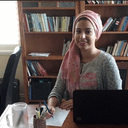Stay in the Loop
BSR publishes on a weekly schedule, with an email newsletter every Wednesday and Thursday morning. There’s no paywall, and subscribing is always free.
Arabic music for an American audience
Al-Bustan Seeds of Culture's Arab Music Ensemble

The words fall on the practiced, confident tongues of the young students of Al-Bustan Seeds of Culture’s Arab Music Ensemble. They’re a little heavy perhaps, but otherwise flawless, even to an Arab ear.
It’s surprising, because these are not Arab tongues. And yet they’re singing the words to one of the Arab world’s most recognizable folk songs, “Il Hilwa Di”:
“Il hilwa di amet ta’gin fel badriya/Wel deek beyedan ‘kokoko’ bel fagriya.”
“This pretty girl got up to make her dough outside/And the rooster calls out ‘kokoko!’ as the dawn comes up.”
The song, written in Egypt during British colonialization, is one of optimism, encouraging the working class to go out into the world every morning with positivity and faith. Times are difficult, the song acknowledges, but with hard work and a can-do attitude, God will not only provide for us, He will also bless us with that most valuable of commodities: happiness.
Connecting cultures
The students’ performance, led by prominent Lebanese singer Oumeima El Khalil, is part of a monthly concert series hosted by Al-Bustan Seeds of Culture, a Philadelphia community organization dedicated to promoting Arab arts, culture, and music. Founded in 2002 by Hazamy Sayed as a way of helping her two sons connect with their Arab heritage and identity, the organization provides unique opportunities for young Americans to learn about and connect with Arab culture in a way that transcends stereotypes and assumptions.
Musician Hanna Khoury is the director of the Arab Music Ensemble, a transplant to Philadelphia after years working with artists such as Shakira and Beyoncé, and touring with Arab greats such as the legendary “Jewel of Lebanon,” Fairuz.
Since leading the first ensemble in the spring of 2009, Khoury, who describes himself as “bi-musical,” has made it his mission to highlight the program’s intercultural elements. Trained in both Arab and Western musical traditions, he uses his expertise to bridge the gap between traditional Arab musical stylings and those from other cultures. He creates one-of-a-kind concerts that are not only accessible to American audiences, but that also demonstrate the Arab region’s connections with the world. The ensemble collaborates with other Philadelphia area choirs, including the Prometheus Chamber Orchestra and the Crossing Choir.
In one week, a lifetime of change
“The programs present our culture in a very meaningful way,” Khoury says. “Music is the making of an artist whose ideas are shaped by the historical, social, and political contexts [of their country].” When students understand that context, they can connect with the music and the culture on a deeper level. He explains, “It adds to whatever field they choose to pursue. Whether they go abroad or stay here, they will never look at Arab culture as what they see on television because of that connection they develop to those composers.”
Context is at the heart of Al-Bustan’s mission, and it is a two-way street. The program seeks not only to bring Arab musicians to Americans, but also to showcase Arab music in parallel with other musical cultures from the region and the world, inviting artists from Iran, Turkey, and more recently Puerto Rico, to play in tandem with Arab musicians.
The program’s week-long residency, part of the monthly concert series, also gives musicians an unprecedented opportunity to connect with U.S. audiences.
“Arab performers who come to the United States usually either target areas with large Arab populations, or, for more diverse audiences, they do one-off performances,” Khoury says. “Here they stay for a week, and we take them to our events and our after-school program at John Moffet Elementary School.”
Empathy and star power
Although it can be a struggle to promote the concerts in a city where only a small percentage of the population will have heard of the headliners, audience diversity is something the musicians notice and appreciate. This challenge is something Al-Bustan embraces: “It makes for a good mix in the audience, making sure that the program fits the American context,” Khoury says.
The concerts are an integral part of the intercultural connection Khoury seeks to cultivate. The series, now in its fifth year, has hosted some of the most important performers in modern Arab music, including Grammy Award-winning Egyptian musician Fathy Salama. Khoury says choir members are given the opportunity to sing with artists who have fully immersed themselves in their musical styles and traditions. That gives the students a more complete understanding of the social and historical contexts from which these artists have emerged.
Al-Bustan’s programs have also benefited from the proliferation of musical institutions in Philadelphia that have provided them with funding and support. The mission of Al-Bustan is well worth that support, since its programs transcend a purely artistic focus to create an environment where young Americans can develop empathy and appreciation for a culture that is often misrepresented. The message of “Il Hilwa Di,” for example, is particularly relatable to American listeners, reflecting as it does the shared values of hard work, optimism, and faith. Creating a dialogue between musical styles not only facilitates a more empathetic understanding of Arab culture, it also enriches the American music scene in much the same way our country is enriched by the multitude of cultures that live here side by side.
What, When, Where
Al-Bustan and PNC Arts Alive co-present a cross-genre reinterpretation of works by Vivaldi, M. Abdel Wahab, Raphael Hernandez, and Chick Corea. June 4, 2016 at Oxford Mills, 100 Oxford St., Philadelphia; and June 17, 2016 at Church of the Advocate, 1801 Diamond St., Philadelphia. (267) 809-3668 or albustanseeds.org.
Sign up for our newsletter
All of the week's new articles, all in one place. Sign up for the free weekly BSR newsletters, and don't miss a conversation.

 Nadia Eldemerdash
Nadia Eldemerdash